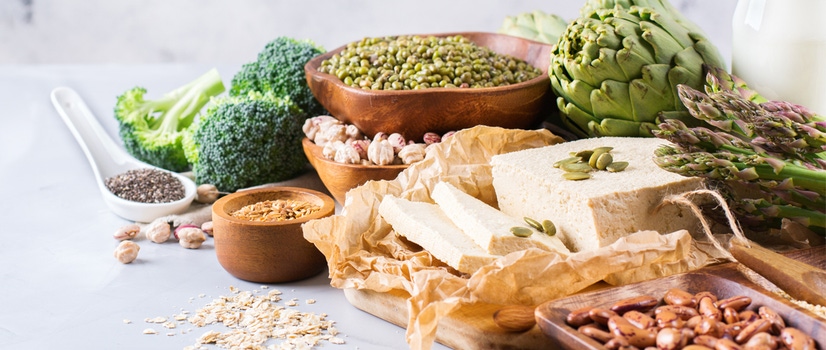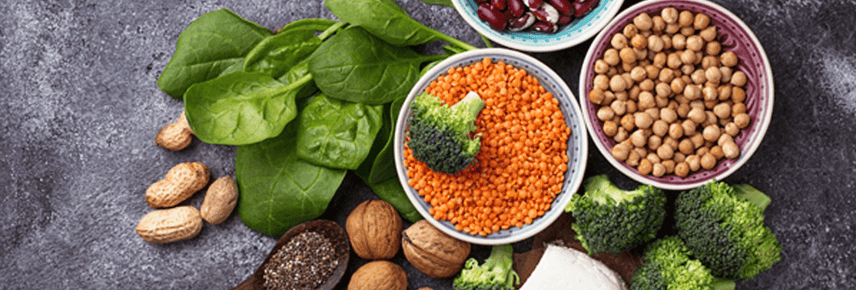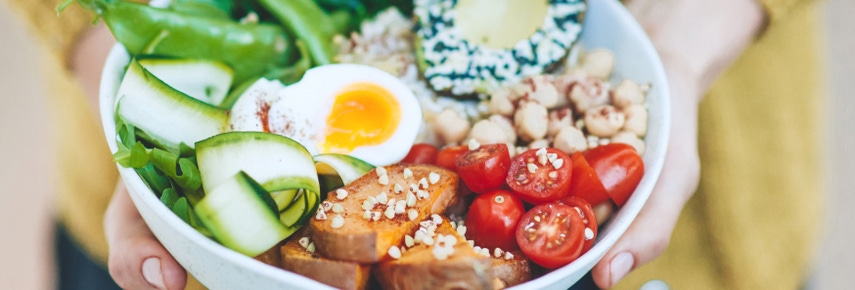
A no-bull guide to plant protein
Going vegetarian or simply cutting back on meat doesn’t mean your diet will be lower in protein. There’s a plethora of plant foods that contain this important nutrient.
As well as helping build muscle, protein is important for bone health, recovery from injury or surgery, keeping your appetite in check and healthy growth (especially for kids and teens). Plant protein also boasts big credentials particularly for heart health, cholesterol, and research tells us legumes in particular help you live longer.
Nutrition Research Australia has recently summarised the past 20 years of research on plant protein and health and examined some of the most common questions about plant protein.
Plant protein vs animal protein – what’s healthier?
Evidence consistently shows that eating more protein from plant sources is associated with better health.
Plant protein has been associated with improved risk factors for cardiovascular health, reduced risk of type 2 diabetes and a longer lifespan. One study even found that replacing just 3% of energy a day from animal protein with plant protein was associated with a 5% lower risk of death from all causes. So even one extra meat-free meal a week can make a difference.
Swapping out animal protein for plant protein was also found to be particularly good for the heart as it was associated with improved cholesterol and other risk factors for heart disease. Another key study investigated protein from nuts and seeds specifically and found this to be among the best sources of protein for the heart – it was linked with a 40-60% reduced risk of death from heart disease.
Why is plant protein good for you?
There are a number of reasons why plant protein may be healthier, but exactly why remains unclear. A possible reason could come down to the types of amino acids, or building blocks, typically found in plant protein.
Breaking that down, plant protein is generally higher in the amino acids arginine and cysteine, and lower in the amino acids leucine and histidine. Why does this matter? Arginine has been linked with improved metabolism, and cysteine with reduced insulin resistance and oxidative stress.
On the other hand, the amino acids leucine and histidine, which are generally found in greater amounts in animal-based protein foods, have been linked with increased body weight and insulin resistance in animal studies.
But consider this, plant proteins are also a great source of protective phytochemicals and plant sterols. They are an important source of iron and zinc, fibre and nutrients such as calcium, potassium, magnesium and folate. They are low in fat, particularly saturated fat and are cholesterol free. So, there are lots of reasons to substitute plant protein for animal protein.
What plant foods are higher in protein?
Legumes like chickpeas, kidney beans and soybeans (as well as their products like tofu, soy milk and tempeh) are great sources of protein and are easy to add to meals. A cup of chickpeas has 11g of protein, a cup of soybeans a whopping 20g.
Nuts are often thought of as a great source of healthy fats, but it turns out they are a major source of plant protein too. Just a handful of nuts (a 30g serve) can provide up to 6 grams of protein. Here’s a list of more common plant-foods that contain protein.
Can I get all the protein I need from plants?
There are nine ‘essential’ amino acids that we need to get from the protein we eat. If a food contains all nine of the ‘essential’ amino acids, it is called a complete protein.
It’s often argued animal proteins are better because they contain all nine essential amino acids. However, there are also plant foods that are commonly thought of as “complete proteins” or high quality proteins. These include soy bean, quinoa, amaranth, fonio and pistachio nuts.
It’s also argued that we need to combine or complement plant foods to get all the nine essential amino acids from plants. But research shows that this is unnecessary. It’s simply a matter of eating a variety of plant proteins over the course of the day, making sure you also eat sufficient calories to maintain your normal weight. As back up, our body has an internal pool of amino acids we can draw on if needed.
Most people, including vegetarians and vegans, eat enough protein as requirements are surprisingly small. Just 46g per day for an average woman, and 64g per day for an average man. That’s 0.8g of protein per kilogram of body weight. We generally eat twice that amount. In fact, eating too much protein comes with its own risks. So we really don’t need to be so obsessed about protein.
Can you build lean muscles from plant protein?
A number of studies have linked a diet high in plant protein, as part of a plant-based diet, with weight loss. But when it comes to building lean body mass, that’s certainly possible too. An analysis of studies on protein supplementation found plant-based soy protein to be as effective as whey protein (which is derived from dairy).
Rio 2016 Olympic US champion weightlifter Kendrick Farris, for example, relies on just plants for his protein. Similarly, there are vegan athletes who are ironmen champions, so yes, you can get all the protein you need on a plant-based diet for building muscle.).
For more on plant protein read on.

The latest nutrition advice, plus health and wellness tips delivered to your inbox monthly
.png)

